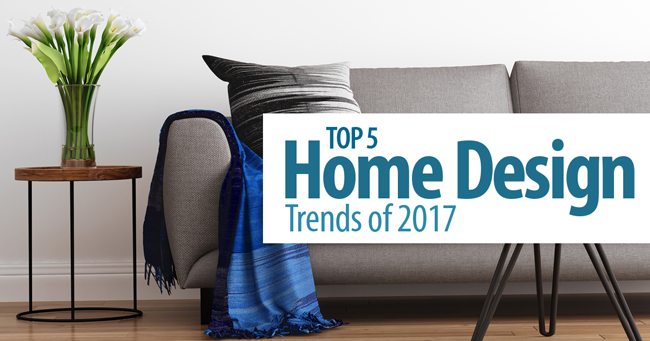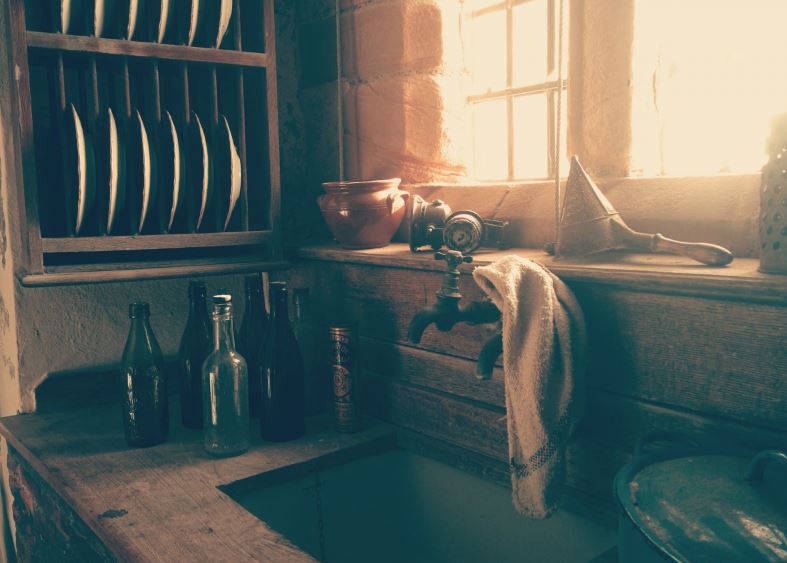Top 5 Home Design Trends of 2017
The current trends are all about utilizing rich color, maximizing texture and creating comfortable interiors you can’t wait to relax in. Use these trends to get inspired to makeover your home’s interiors and create spaces you love that also appeal to your personal style. Remember, if you plan to sell in the next few years, you may want to avoid doing anything dramatic and instead incorporate small changes that would appeal to buyers.
Why are these trends gaining popularity?
The underlying theme of these trends is creating a home environment you love; one that appeals to your emotions and feels like a retreat from the stresses of the world. Although the home is a place where you can relax and spend time with loved ones, work expectations are beginning to blur the line between work and home. Even if people don’t work from home specifically, many are stretching their work hours into their evenings and weekends to complete work projects.
It’s no wonder the Nordic concept of hygge (most often pronounced “hoo-gah”) has become a hot trend. A centuries-old concept, incorporating hygge in the home means creating simple and comfortable spaces that make you feel cozy and safe and appeal to your senses.1 The emphasis is on simplicity and fostering positive experiences, whether you’re spending time with family, reading a good book or catching up on work emails.
WARM AND RICH COLORS.
Whether you want to play with a bold color or stick with neutrals, one thing is clear—paint is the foundation of a great design. Painting your interiors has a return on investment of about 75 percent and is a relatively inexpensive project to complete, costing between $25 to $100 for paint alone.2 If you’re thinking of refreshing your home’s interiors with a coat of paint, popular colors include warm taupe, fresh green and dark tones. These colors are popular choices because they evoke feeling of warmth and coziness when you walk into a room.
Wondering how to pair these colors? Taupe is the perfect alternative to traditional neutrals, such as gray and white, and goes well with cool blues, earthy greens and deep shades of wine. Green goes well with other earthy shades, such as copper and moss, as well as deep plum and bright pink. If you’re hesitant to paint your walls green, incorporate it into your home by way of accent pillows, rugs, lamps, vases and other accessories or add a few house plants.
If you’re interested in adding more drama to a room, include bold, dark colors. Dark shades add color and sophistication to any space. Plum and dark gray pair well with pale blues, warm whites and light gray.
Try one of these Colors of the Year:
Poised Taupe – Sherwin Williams
Greenery – Pantone
Shadow – Benjamin Moore
RICH MATERIALS.
Lux materials create a space in which you can’t wait to kick off your shoes and relax at the end of the day. The Danes use a mixture of materials and pattern as a way of adding character and interest; however, the overall look still needs to adhere to a color palette to prevent it from looking distracting.
Natural materials and textures allow you to maximize the comfort of the bedroom, living room or family room. Wood accents give rooms an earthy feel. Incorporate rustic wood sculptures, trays and furniture into your space. Choose furniture made with sustainably harvested wood certified by the Forest Stewardship Council (FSC) or use reclaimed wood for an environmentally friendly alternative.
If natural elements aren’t your style, but you want to add more visual interest to your room, try mixing patterns. Although it may have been avoided in the past, mixing stripes, florals and geometric prints actually help ground a space as long as the patterns feature complimentary colors or different shades of one color. If you’re worried about going overboard and making your room look “busy,” focus your mix in one area of the room. For example, add throw pillows in a variety of patterns to your sofa.
GOING GREEN.
According to a recent study from the American Psychological Association, people are more stressed than ever, with 24 percent of adults reporting they’re experiencing “extreme stress.”3
Top sources of stress include work and money. By incorporating small changes, like making your house more energy efficient, you can start to lower your bills and get back to relaxing and enjoying life like the Danish do (who consistently top the polls as the happiest people).
Save money on your energy bills by sealing the “envelope” of your home, which includes the windows and doors, walls, floor and roof. The better insulated your home is, the less heat will escape and the lower your energy bill (and stress level) will be.
The most heat loss occurs through the walls of the home: up to 35 percent of heat loss, to be exact.4 Ceramic insulating paint is a space-inspired coating of paint mixed with ceramic compounds and applied to the interior or exterior surfaces. It seals your walls and prevents heat from escaping, which means reduced energy bills all year long.
THE FUNCTIONAL HOME OFFICE.
Twenty-four percent of employed people do some or all of their work at home.5 Since more people are working remotely than ever, home offices are becoming more popular. Even if you don’t plan on working from home, a home office gives you a place to pay bills, work on personal projects, plan your family’s schedule and more. Home offices tend to be multifunctional, serving as a guest room when family and friends visit and have the potential to meet other needs that arise.
The key idea behind hygge is to enjoy the environment around you and for each room to be a sanctuary to sink into at any given moment. Your home office is no exception! Maximize your productivity, efficiency and focus by painting the walls shades of green or blue.6 If space is an issue, create a nook by installing docking and tech cabinets that are big enough to store a printer and other small office equipment and files without taking over the room.
If you don’t have room in your home for an office, look no further than your backyard. Shedquarters, small structures or sheds built in the backyard for use as an office or home-based business, are an attractive option for homeowners who don’t have a room to dedicate to an office and don’t wish to add to their homes. while the jury is out on how much value these structures add to a home, they can convert easily into a storage shed if you plan to sell in the future.
SPLURGING ON KITCHEN RENOVATIONS.
The kitchen is often the busiest, most hectic room in the house and one of the top renovation projects with a high return on investment.7 We do more than cook meals there; it’s where homework is done, bills are paid, weeks are planned and more.
Kitchen remodels consistently show a respectable return on investment. According to the 2017 Cost vs Value Report from Remodeling magazine, a minor kitchen remodel touts an 80.2 percent return on investment.8 You don’t need to overhaul your entire kitchen to make it more hygge. Smaller additions can transform it into a relaxing and functional space you enjoy spending time with friends and family in.
What does a “minor kitchen renovation” entail? In addition to replacing the fronts of your cabinets and drawers, it also includes replacing out-of-date appliances and fixtures. You may also consider replacing countertops. Quartz and quartzite are becoming more common as are other green laminate options, including ones that mimic stone, wood, and concrete. Laminates install in less time, often over the existing countertop, make it an ideal choice for busy homeowners as well. Other hot kitchen trends include incorporating sustainable materials like bamboo into your countertops and floors and water filtration systems.
Want to improve the look and feel of your home’s interior? Are you thinking of upgrading to a home that better fits your changing needs? Call us—we’d love to help you achieve all of your home-related dreams.
Sources: 1. Time, Hygge, the Nordic Trend That Could Help You Survive 2016






Leave A Comment
You must be logged in to post a comment.